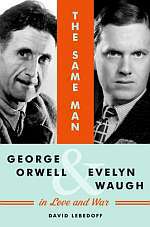Books
The Same Man?

I suspect that the title of this little dual biography was intended to produce in the potential reader (i.e., anyone even a little familiar with Waugh and Orwell) precisely the reaction it produced in me upon hearing it: I exclaimed something to the effect of, “Say what?” and promptly plunked down twenty-six bucks (minus my local indie bookstore’s “faithful customer” discount) to purchase it. I mean, any writer attempting so patently impossible a task as to find commonality between the lives, personalities and works of the authors of 1984 and Brideshead Revisited deserves a fellow scribbler’s support, for sheer chutzpah if nothing else.
Yes, both men were born in 1903 in the British “upper middle” class and became important writers of their day, and ours. (To write novels which are both bestsellers in one century and “classics—and still widely read—in the next amounts to authorial Parnassus.) But really now…George Orwell (né Eric Blair) was also an atheist and socialist who abandoned, not only his own class, but the very concept of class, while Evelyn Waugh, who converted to Catholicism in his thirties, venerated—I would have said “worshipped”, but he was an orthodox curmudgeon—the British nobility to whose exalted circles he so feverishly sought admittance. (It is no accident, as Lebedoff points out, that both Waugh’s wives were members of the Herbert family, and closely related to the Earls of Pembroke.)
Still, even if the title, “The Same Man”, proves as hyperbolic as it is fetching, Lebedoff is exaggerating to make an important point: both Orwell and Waugh were prophets in their own way, emerging from opposite ends of the political and religious spectrum to pen brilliant jeremiads against the gray, conformist, dehumanizing, and soul-sucking totalitarianisms they saw vacuuming up the promised land of the western world and clouding the intellects, sensibilities, and even speech of so many of their fellow artists and scribes. In exposing the “smelly little orthodoxies” of their day, as Orwell described the prevalent hypocrisies—in the twenty-first century we call this form of Orwellian Doublespeak “political correctness”, and it has dialectical variants on both Left and Right—each man men incurred the wrath of ideological fellow-travelers as well as opponents.
Despite their differences, then, it is no accident that Orwell and Waugh had tremendous admiration for one another, as should we. As Lebedoff puts it:
“Today, George Orwell’s essays and some of his novels and Waugh’s body of fiction are considered masterworks. It is easy now to claim these authors as the literary giants of their time. And both of them hated, really hated, that time—the twentieth century, from the First through the Second World War—and what they knew was sure to follow it.
They saw in modern life a terrible enemy. It was not only totalitarianism that they loathed but virtually everything that would come even if totalitarianism was defeated. They saw an end to common sense and common purpose. They saw the futility of life without roots or faith. They saw the emptiness of an existence whose only point was material consumption. And in the great work of their lives, which was to warn us of what was to come, they came to be, improbably enough, in many ways the same man.”







